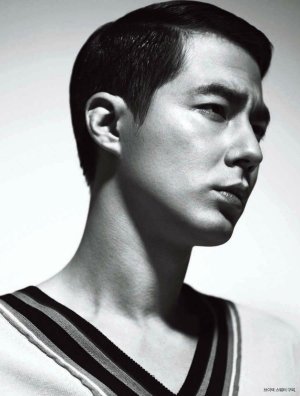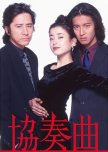This review may contain spoilers
AN AVANT-GARDISTE DRAMA SERIES.
A "Should-See" drama whether you are a fan of ménage-à-trois or not.
If one comes to Concerto with the notion that the one and only valid type of consummate (passion + intimacy + commitment) love relationship is heterosexual and between 1 man and 1 woman, then you'll judge the storyline quite harshly. Please approach this series with a certain open-mindedness about alternative relationships in order to understand the intricacies of the story, and the dynamics within the love triangle.
The Bad: The emphasis should have been on all three leads being passionately in love from the get-go: both men with Hana, and Hana (equally) with both men. Because this emphasis was missed (in the writing/directing/acting):
- Hana Sakaki's character, up until the last couple of episodes, came across as indecisive and selfish; a gold-digging floozy who wanted to be availed with two men she could be intimate with when she chooses.
- Kosuke Ebisawa seemed like a jealous self-centered has-been celebrity architect who used, abused, and deprived a younger, more capable Kakeru Takakura of his love and talent.
- And Kakeru Takakura, my favourite character, appeared as though he lacked the confidence to stand on his own as a genius architect, and was in an emotionally unhealthy love triangle he could not move away from.
But things are not as simple as they appear...
The Good:
1) Chapeau! Though polygyny (relationships involving 1 male & 2 or more females) is common fare, polyandry (1 female & 2 or more males) is not, and is rather frowned upon or even taboo in many places of the world (at the exception of the Himalayan cultures (fraternal polyandry)). I thought it extremely commendable and avant-gardiste that the writer, the director and a cast of talented actors took a chance on such an off-limits and borderline risqué script 23 years ago. And the delivery? Well done, in my humble opinion!
2) The maturing of the characters: The understanding and acceptance by the 2 concerned men of their situation is remarkable. The character growth of both main and secondary leads is progressive and consistent. The viewer ultimately comes to the understanding and conclusion that there is no other way for the three involved individuals to be happy than by being together.
This is a blood-pressure-raising and thought-provoking drama. The reasons why most commentators below hated it are the reasons why I liked it.
If one comes to Concerto with the notion that the one and only valid type of consummate (passion + intimacy + commitment) love relationship is heterosexual and between 1 man and 1 woman, then you'll judge the storyline quite harshly. Please approach this series with a certain open-mindedness about alternative relationships in order to understand the intricacies of the story, and the dynamics within the love triangle.
The Bad: The emphasis should have been on all three leads being passionately in love from the get-go: both men with Hana, and Hana (equally) with both men. Because this emphasis was missed (in the writing/directing/acting):
- Hana Sakaki's character, up until the last couple of episodes, came across as indecisive and selfish; a gold-digging floozy who wanted to be availed with two men she could be intimate with when she chooses.
- Kosuke Ebisawa seemed like a jealous self-centered has-been celebrity architect who used, abused, and deprived a younger, more capable Kakeru Takakura of his love and talent.
- And Kakeru Takakura, my favourite character, appeared as though he lacked the confidence to stand on his own as a genius architect, and was in an emotionally unhealthy love triangle he could not move away from.
But things are not as simple as they appear...
The Good:
1) Chapeau! Though polygyny (relationships involving 1 male & 2 or more females) is common fare, polyandry (1 female & 2 or more males) is not, and is rather frowned upon or even taboo in many places of the world (at the exception of the Himalayan cultures (fraternal polyandry)). I thought it extremely commendable and avant-gardiste that the writer, the director and a cast of talented actors took a chance on such an off-limits and borderline risqué script 23 years ago. And the delivery? Well done, in my humble opinion!
2) The maturing of the characters: The understanding and acceptance by the 2 concerned men of their situation is remarkable. The character growth of both main and secondary leads is progressive and consistent. The viewer ultimately comes to the understanding and conclusion that there is no other way for the three involved individuals to be happy than by being together.
This is a blood-pressure-raising and thought-provoking drama. The reasons why most commentators below hated it are the reasons why I liked it.
Was this review helpful to you?























